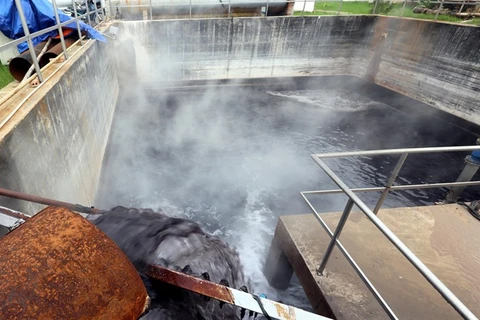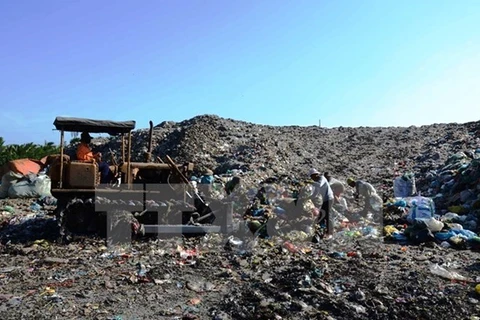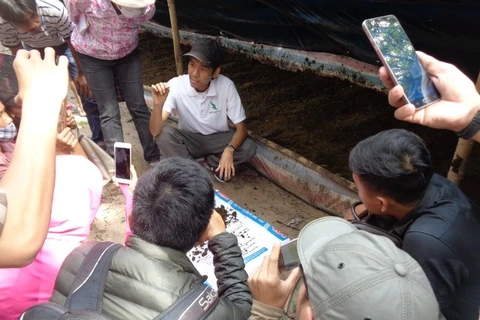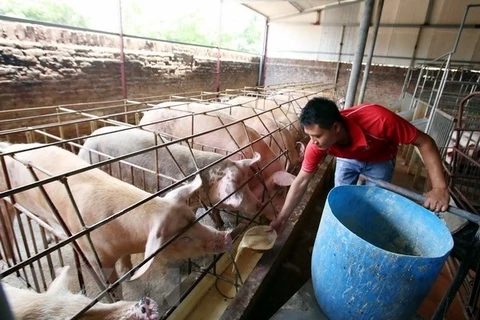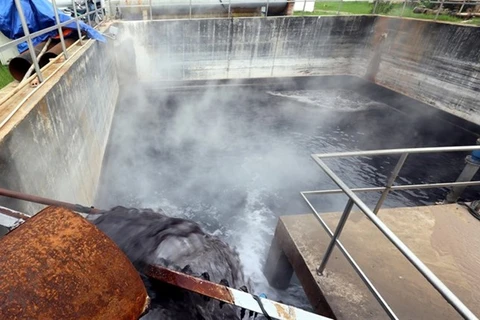 Livestock waste has become a grave problem for Vietnam (Source: Ministry of Agriculture and Rural Development)
Livestock waste has become a grave problem for Vietnam (Source: Ministry of Agriculture and Rural Development)Hanoi, (VNA) - Vietnam has carried out a number of international cooperation programmes on animal waste treatment (with FAO, the Netherlands, Denmark, France, Belgium ...), with a noteworthy example being the Low Carbon Agricultural Support Project under the Ministry of Agriculture and Rural Development (MARD).
The project, using loans from the Asian Development Bank (ADB) and aiming to seek a comprehensive solution for livestock waste disposal, is receiving strong support from farmers throughout the country.
Livestock waste, a new problem for Vietnam
In recent years, thanks to the Doi Moi (renewal) policy, agriculture has recorded a high growth rate, contributing remarkably to the socio-economic development of the country. However, such a rapid development has also given rise to environmental concerns, particularly those related to farm-scale and household-based farming. In the country, livestock waste is becoming a problem.
According to the Department of Livestock, every year animal breeding farms release about 80 million tonnes of solid waste, tens of billions of cubic metres of liquid waste, and several hundred million tonnes of gas emissions. Although animal husbandry farms have applied environmental treatment solutions (commonly the construction of large scale biogas works), pollution has been increasing, especially water pollution and air pollution.
The Asian Development Bank (ADB) supports Vietnam in the treatment of animal waste.
In the context of climate change, Vietnam has adopted a number of policies and technologies for comprehensive management of animal waste.
In the past five years, the Low Carbon Agricultural Support Project (LCASP) funded by loans from the ADB, has developed livestock waste solutions for medium and large scale farms, specifically the development of small-scale biogas systems, the production of organic fertilizers and the treatment of post-biogas liquid waste to be used as liquid organic fertilizer.
Mr. Manohar Shrestha - Senior Consultant for the Low Carbon Agriculture Support Project (LCASP) said: “The project has seen very enthusiastic participation of farm households and farms in the construction of biogas tanks of different sizes and application of different technologies in the production of organic fertilizer. This project contributes to the health of women, as the use of biogas reduces the pollution caused by the use of gas and coal, as well as reduces the working time of women and the impact of environmental pollution on their health. LCASP is conducting research and demonstration of technologies such as biogas generator, fertilizer separator, organic fertilizer production. Capacity building and training are also important parts of the project. At present organic production in the world is very developed and the LCASP will contribute to making Vietnam one of the leading organic agriculture countries.”
As of December 2017, the LCASP project has supported the construction of more than 50,000 small works, 19 medium and 2 large scale projects.
To effectively treat livestock waste and protect the environment, the LCASP project provides an environmental package for biogas plants, including: disinfected pits or faucets for washing hands and feet when going into and out of breeding facilities, thus preventing infection; a waste collection system to ensure the amount of waste suitable to the treatment capacity of the biogas plant; a separation system for collecting solid waste for organic fertilizer; reservoirs or sedimentation tanks; filter tanks to treat wastewater discharged from biogas tanks prior to fertilizer application; and equipment to thoroughly use gas.
The package also includes training and educating people about the environment of animal husbandry to ensure that they prevent the spread of livestock diseases, properly discharge waste from biogas digester, and treat leftover waste by other means without discharging directly emission gas to the environment.
 Vegetable farming using wastewater discharged from biogas systems generates good profit (Source: Ministry of Agriculture and Rural Development)
Vegetable farming using wastewater discharged from biogas systems generates good profit (Source: Ministry of Agriculture and Rural Development)Attracting investment in environmental protection in animal husbandry
In the past few years, Vietnam has implemented several international cooperation programs and projects that have brought about practical effects in the management of waste and protection of livestock.However, the scope of these projects is limited while the livestock sector in Vietnam is facing increasingly severe environmental pollution.
The Director of LCASP Nguyen The Hinh said: “In order to achieve our committed goal of reducing greenhouse gas (GHG) emissions, Vietnam is in great need of help from international organizations to build 300,000 to 500,000 small-scale biogas plants in the period from now until 2030. In addition, Vietnam needs support and technology transfer from developed countries such as Denmark, the Netherlands for large-scale treatment of animal waste into organic fertilizer. The amount of waste in the livestock sector is huge so the conversion of the waste into bioenergy and organic fertilizer will generate billions of US dollars for the national economy."
To thoroughly handle environmental pollution in livestock breeding, the State should increase the budget for surveys and surveys on animal breeding environment and environmental protection. Localities should encourage units and individuals to engage in environmental protection in animal husbandry. In addition, it is necessary to promptly report to higher management agencies on polluted areas and polluting establishments so as to work out measures to address the problems, toward reducing the pollution burden in the future./.
